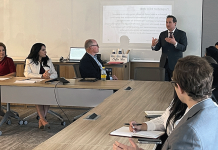Cross posted in the Inland Valley Daily Bulletin
The bedrock of our democracy is its justice system — and people flock to the United States and California from across the globe just to live in a society that will allow them to work hard and be treated with dignity and fairness.
But today, California’s courts are in distress. Unprecedented budget cuts since 2008 have closed 52 courthouses and 202 courtrooms and produced court delays in many counties that run for years. It is demeaning and unfair to everyone who enters a courthouse seeking justice for anything from child custody cases to business disputes.
Furthermore, like many government agencies, California’s courts are behind the times and should be doing more to innovate and incorporate the latest technology into their operations to cut costs, improve service and deliver on its vital mission.
Every day thousands of Californians encounter shortened court hours, closed courthouses and overworked staff — and when they do get through the judicial process, they often get hit with hefty fines and penalties that don’t fit the violation. It feels like a time warp, a 20th century experience in a state known for pioneering the future, for leading the way in technological advances, from smart phones to self-driving cars, that are revolutionizing our lives.
I applaud Gov. Jerry Brown for proposing a 5.4 percent increase in overall court funding and $30 million to pay for innovative programs aimed at improving court service. The governor is on the right track, but much more needs to be done.
During the last decade, fines and fees have been increased by the Legislature to support not only the judicial branch, but dozens of other state programs, including emergency medical services, air ambulances, corrections and rehabilitation, and victim compensation. Our courts have been burdened by the need to create and collect revenue, shifting the focus away from serving Californians.
The judicial branch receives just 2.2 percent of the overall state budget. More than half of that money, however, originates from fines, fees and assessments. As a result, the ability to access justice in California is increasingly based on the ability to pay for it.
The guiding principle of the judiciary, and the Legislature, should be to ensure that every Californian has equitable access to justice and the protections of the law — and that those who are punished are done so justly, not excessively as a means to backfill the budget.
Instead, Californians pay onerous penalties for minor infractions like traffic tickets or forgetting to update an address with the DMV. We have evolved to a system in which drivers who cannot afford to pay the initial fines get more penalties tacked on and eventually, in many cases, lose their driver’s licenses.
Uncollected court revenue in fines and penalties now tops $10 billion, so this approach is failing — to fund courts or help violators to make amends.
This past year, we took an important step to begin tackling this problem. With the leadership of the governor and Chief Justice Tani Cantil-Sakauye, California established a new traffic amnesty program. This legislation allows people to talk to a judge if they want to before paying fines, restores driver’s licenses to those with a payment plan and reduces exorbitant fee debts by taking a person’s income into account.
The program will empower tens of thousands of Californians to come clean on tickets and boost court funding by recovering some of the previously uncollected fines.
It’s a start. But there is so much more to do. We can begin by recognizing the importance of the judiciary and its mission — and demanding the same customer service, innovation and equity California’s modern economy provides in so many other sectors.
The courts reunite families, settle disagreements, protect communities from the guilty and exonerate the innocent. They need to be free of the corrosive motive to raise revenue through fees, fines and penalties. Ultimately, the foundation of California and its democracy is its justice system, and we must make sure that it is sound and strong and fair to everyone.
Sen. Bob Hertzberg is chairman of the California Senate Committee on Governance and Finance. He represents the 18th District in the San Fernando Valley.




